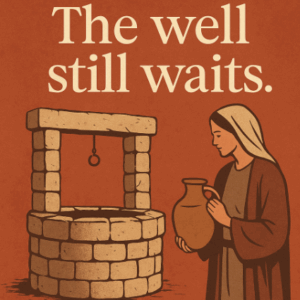 The Well Still Waits
The Well Still Waits
The Kingdom in Our Midst—Then and Now
“The water I give will become in them a spring of water welling up to eternal life.” — John 4:14
The Samaritan Woman came to the well when no one else would—midday, under the brutal sun.
Most women came at dawn or dusk when the air was cooler and the path was safer. But this woman—unnamed, unseen by many—came alone. Not just because of the heat, but because of shame. She had become an outsider among her own. The glances. The whispers. The silent judgment that makes even water feel heavy.
In the ancient world, water collection was women’s work—an essential but thankless task. Every day, they walked the dry roads, balancing jars on their heads or hips, drawing from deep wells to keep families alive. But in this moment, the water jar became something more: a symbol of her burden, her routine, her isolation.
Then Jesus showed up.
Not at the synagogue, not in the temple, not at the well. Tired, dusty, waiting. Then Jesus asked her for a drink, not to receive but to begin a conversation. He spoke directly to her—a Samaritan, a woman, a moral outcast—three strikes culturally. Yet He lingered, listened, and revealed Himself.
He didn’t wait for her to change before He called her.
He changed her by calling her.
He revealed Himself not in a sermon, but in a conversation. Not in a crowd, but one-on-one. And the first person to hear Jesus say “I am the Messiah” wasn’t a rabbi, wasn’t a prophet, wasn’t even a disciple—but a woman, alone and rejected. That’s the Kingdom. It breaks into silence. It reverses every ladder of status we build. It finds us where we are.
The Kingdom in Jesus’ Time
Jesus did more than break social norms. He redefined worth. In His day, women were not taught Torah openly, were not permitted to testify in court, and were rarely counted in public discourse. But He welcomed them, taught them, and trusted them. From Mary of Bethany, who sat at His feet, to Mary Magdalene, who first saw Him risen, Jesus gave women voice, value, and visibility.
To meet this woman at the well was to meet her in her role, in her shame, in her solitude—and to declare:
You are seen. You are chosen. You are sent.
The Kingdom in Our Time
Today, the wells look different. They’re less dusty, but just as dry.
A single mother folding laundry in silence. A man in traffic who feels like a failure. A teenager scrolling endlessly to silence the ache. A caregiver holding on by a thread. These are our modern wells. Places where we carry our burdens, hoping no one asks questions.
But Jesus still meets us there.
He still waits in the ordinary. The sacred is no longer hidden behind curtains or rituals—it is here, in kitchens and crosswalks, text messages and tears. The Kingdom of God is in our midst, not because we ascend to it, but because it has descended to us. Gifted. Near. Active.
The Jar Left Behind
There’s a detail in John 4 we must not miss:
“Then, leaving her water jar, the woman went back to the town…” (John 4:28)
She came to draw water, but left behind the symbol of her burden. The jar she carried in shame became the thing she no longer needed. What she came for no longer defined her.
That’s what happens when the Kingdom breaks in.
It redefines what we carry—and what we can finally lay down.
Scripture says:
“Therefore, there is now no condemnation for those who are in Christ Jesus…” — Romans 8:1
“If the Son sets you free, you will be free indeed.” — John 8:36
Forgiven. Free. Sent with joy instead of shame.
How Do We Embrace This Kingdom?
-
Recognize it. The Kingdom is not flashy. It’s a quiet voice. A shared table. A hand held. When we slow down to notice the person in front of us, when we choose compassion over judgment, we step onto holy ground.
-
Respond to it. The woman ran to tell others. When we’ve met Christ in our brokenness, we cannot help but carry the news. Kingdom people are not perfect people—they are redeemed people who carry grace into graceless places.
-
Reflect it. Jesus didn’t dominate the conversation. He asked questions. He dignified. He loved. In our homes, churches, and workplaces—we reflect the Kingdom when we make space for others to be known, healed, and sent.
Final Invitation
Where is your well today?
What are you carrying?
Who might be waiting for a word, a moment, a spark of dignity?
The Kingdom is not a distant dream or a future reward.
It is within you. It is among us.
And yes—
It’s still waiting at the well.
Hashtags: #TheWellStillWaits #EverydayKingdom #JesusMeetsUs #LivingWater #KingdomInOurMidst #NoCondemnation #ScriptureStory #GospelEncounters